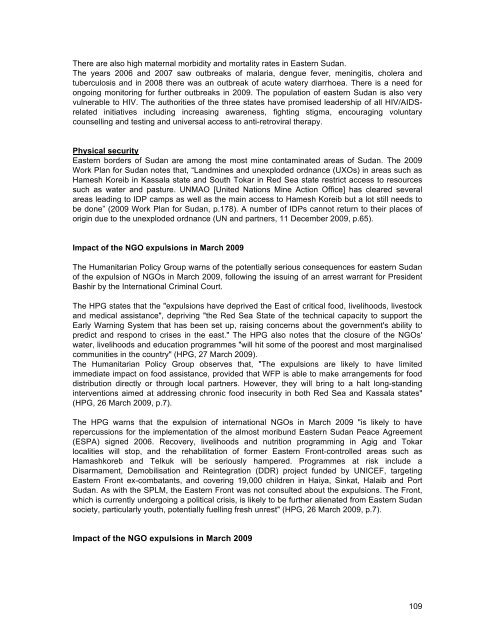SUDAN: Durable solutions elusive as southern IDPs return and ...
SUDAN: Durable solutions elusive as southern IDPs return and ...
SUDAN: Durable solutions elusive as southern IDPs return and ...
You also want an ePaper? Increase the reach of your titles
YUMPU automatically turns print PDFs into web optimized ePapers that Google loves.
There are also high maternal morbidity <strong>and</strong> mortality rates in E<strong>as</strong>tern Sudan.<br />
The years 2006 <strong>and</strong> 2007 saw outbreaks of malaria, dengue fever, meningitis, cholera <strong>and</strong><br />
tuberculosis <strong>and</strong> in 2008 there w<strong>as</strong> an outbreak of acute watery diarrhoea. There is a need for<br />
ongoing monitoring for further outbreaks in 2009. The population of e<strong>as</strong>tern Sudan is also very<br />
vulnerable to HIV. The authorities of the three states have promised leadership of all HIV/AIDSrelated<br />
initiatives including incre<strong>as</strong>ing awareness, fighting stigma, encouraging voluntary<br />
counselling <strong>and</strong> testing <strong>and</strong> universal access to anti-retroviral therapy.<br />
Physical security<br />
E<strong>as</strong>tern borders of Sudan are among the most mine contaminated are<strong>as</strong> of Sudan. The 2009<br />
Work Plan for Sudan notes that, “L<strong>and</strong>mines <strong>and</strong> unexploded ordnance (UXOs) in are<strong>as</strong> such <strong>as</strong><br />
Hamesh Koreib in K<strong>as</strong>sala state <strong>and</strong> South Tokar in Red Sea state restrict access to resources<br />
such <strong>as</strong> water <strong>and</strong> p<strong>as</strong>ture. UNMAO [United Nations Mine Action Office] h<strong>as</strong> cleared several<br />
are<strong>as</strong> leading to IDP camps <strong>as</strong> well <strong>as</strong> the main access to Hamesh Koreib but a lot still needs to<br />
be done” (2009 Work Plan for Sudan, p.178). A number of <strong>IDPs</strong> cannot <strong>return</strong> to their places of<br />
origin due to the unexploded ordnance (UN <strong>and</strong> partners, 11 December 2009, p.65).<br />
Impact of the NGO expulsions in March 2009<br />
The Humanitarian Policy Group warns of the potentially serious consequences for e<strong>as</strong>tern Sudan<br />
of the expulsion of NGOs in March 2009, following the issuing of an arrest warrant for President<br />
B<strong>as</strong>hir by the International Criminal Court.<br />
The HPG states that the "expulsions have deprived the E<strong>as</strong>t of critical food, livelihoods, livestock<br />
<strong>and</strong> medical <strong>as</strong>sistance", depriving "the Red Sea State of the technical capacity to support the<br />
Early Warning System that h<strong>as</strong> been set up, raising concerns about the government's ability to<br />
predict <strong>and</strong> respond to crises in the e<strong>as</strong>t." The HPG also notes that the closure of the NGOs'<br />
water, livelihoods <strong>and</strong> education programmes "will hit some of the poorest <strong>and</strong> most marginalised<br />
communities in the country" (HPG, 27 March 2009).<br />
The Humanitarian Policy Group observes that, "The expulsions are likely to have limited<br />
immediate impact on food <strong>as</strong>sistance, provided that WFP is able to make arrangements for food<br />
distribution directly or through local partners. However, they will bring to a halt long-st<strong>and</strong>ing<br />
interventions aimed at addressing chronic food insecurity in both Red Sea <strong>and</strong> K<strong>as</strong>sala states"<br />
(HPG, 26 March 2009, p.7).<br />
The HPG warns that the expulsion of international NGOs in March 2009 "is likely to have<br />
repercussions for the implementation of the almost moribund E<strong>as</strong>tern Sudan Peace Agreement<br />
(ESPA) signed 2006. Recovery, livelihoods <strong>and</strong> nutrition programming in Agig <strong>and</strong> Tokar<br />
localities will stop, <strong>and</strong> the rehabilitation of former E<strong>as</strong>tern Front-controlled are<strong>as</strong> such <strong>as</strong><br />
Ham<strong>as</strong>hkoreb <strong>and</strong> Telkuk will be seriously hampered. Programmes at risk include a<br />
Disarmament, Demobilisation <strong>and</strong> Reintegration (DDR) project funded by UNICEF, targeting<br />
E<strong>as</strong>tern Front ex-combatants, <strong>and</strong> covering 19,000 children in Haiya, Sinkat, Halaib <strong>and</strong> Port<br />
Sudan. As with the SPLM, the E<strong>as</strong>tern Front w<strong>as</strong> not consulted about the expulsions. The Front,<br />
which is currently undergoing a political crisis, is likely to be further alienated from E<strong>as</strong>tern Sudan<br />
society, particularly youth, potentially fuelling fresh unrest" (HPG, 26 March 2009, p.7).<br />
Impact of the NGO expulsions in March 2009<br />
109
















